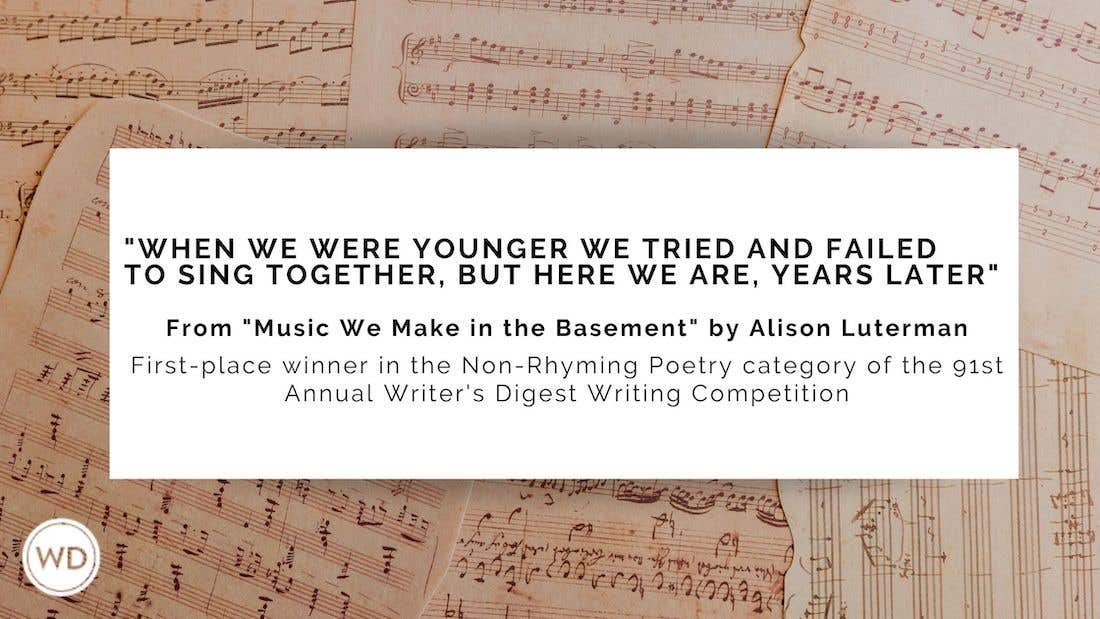2010 Grand Prize Winner: Lunch with Debbie
Read the winning entry in the 79th Annual Writer’s Digest Writing Competition. by Julie L. Moran
Jolene lumbered up the creaking stairs. Her heavy frame swayed with the side to side rhythm of a docked boat. As she moved, her housecoat swung the opposite way with a swishing sound. When she neared the top, she paused, holding tightly to the railing to keep from falling backwards. Three more steps to go, she told herself.
After catching her breath at the top step, she started down the dim hall where the paint had silently peeled away, like layers of memory, from lack of attention. At the end of the corridor, she stopped in front of a door that was once a delicate pink and gently knocked.
“Debbie, honey. It’s me, Mamma.” Her voice was soft and hesitant, and sang with a sweet drawl. “Come on down to lunch as soon as you’re ready, sweetheart,” she continued, her voice louder now. “I made you your favorites.”
Jolene didn’t wait for a response. She started back downstairs, gripping the banister hard and navigating the steps as though she were climbing down steep rocks. She paused at the bottom to gaze at a photograph of her and Earl with Debbie at age six. Debbie wore a white sundress covered with sunflowers. Debbie’s silly grin, missing both front teeth, beamed back at her. Jolene smiled back unconsciously.
Some people’s photos were posed, but Debbie really was that happy little girl, always smiling. The kind who brightened a room when she entered.
Jolene suddenly noticed how much Earl had changed over the past ten years since the photo was taken. His eyes were so different now. So watery and bloodshot, they reminded Jolene of a basset hound. Lately, the bottom lids had begun to sag like piles of spilled pudding, making him look older than his fifty-two years. Her husband was a tall man, though he’d never been imposing the way some big men were. That was probably due to the fact that Earl wasn’t much of a talker. He’d become even quieter over the past couple of years.
As always, Earl stood behind Jolene and Debbie in the photo. Behind them, the annual Buellerton Picnic was taking place, evidenced by the tablecloths and blankets scattered on the ground, covered with baskets of food and people dressed in their holiday best.
Earl was loving in his own quiet way, yet always at a distance, as though he were orbiting his family, protectively, without actually participating in their daily lives. Even now, he rarely came home for lunch. After dinner, he’d sit out on the porch alone, rocking and watching the woods across the yard while his cigarettes burned down to his fingers.
Sometimes he seemed like a pillar of strength, suffering in silence. Other times, he seemed like a broken man who didn’t believe in burdening his wife with his problems. It was difficult to approach a man like that, or trouble him with her own complaints. Sweethearts since high school, she knew Earl loved her with the same confidence she knew the sun would rise again tomorrow. At least that much didn’t have to be said.
He adored their daughter, too, of course. Though he’d hoped for a boy, when the doctor pronounced Debbie a girl, he looked her over carefully, as if not quite believing it. After a while, he said, “This apple’s missing the stem, all right.” Then he rocked her, ever so gently, like the fragile thing she was.
Jolene smiled more broadly now, picturing Earl as a docile, churlish giant seated patiently among Debbie’s dolls and stuffed animals, sipping pretend tea from a tiny plastic tea cup.
She started away quickly and felt her right knee start to burn and give out. Her aches and pains seemed to get worse each year. Like the house itself, she knew she was slowly decaying from the inside out. From age, surely, and the benign neglect of routine. She orbited inside the house much the same way Earl orbited around it.
A kitchen timer went off, startling Jolene from her thoughts. “My cornbread!” she cried aloud. Usually she could smell when baked things were done. Unless she got preoccupied.
The kitchen was thick and warm with the greasy aroma of fried chicken. She punched off the oven timer and grabbed open the counter drawer next to the oven, rooting around for an oven mitt. She grabbed one out, then had trouble closing the drawer. It was piled up with packets of Juicy Fruit, Debbie’s favorite gum. Every time she pictured her, it was with that gum in her mouth, chewing away. She said it kept her from getting thirsty during cheerleading practice. Every time Jolene went for groceries, she found herself picking up a pack, though she never chewed it herself. Finally, she smoothed the packs down enough to close the drawer.
She lifted the pan of cornbread out of the oven and placed it on the stovetop. Next to the cornbread was a platter of fried chicken -- all white meat, just the way Debbie liked it. She began to hum as she picked up the chicken and placed it on the table beside a steaming bowl of okra. Next, she set the cornbread and a cutting knife on the table. She smoothed the white tablecloth, the one she usually reserved for special occasions, with her hand, and carefully straightened the two china and silver places she’d set across from one another.
When she finished, she pulled a chair out from the table and slowly lowered her body into it. The plastic cushion wheezed and groaned as she sat down. She stopped humming and thought of Debbie.
Just then, Debbie bounced into the kitchen, dressed in faded jeans and a pink sweater. She wore her favorite pink lip gloss that smelled like overripe cherries. Her hair was pulled up in a high ponytail that swished and bobbed as she walked. Around her neck was the gold cross with the three tiny pearls they’d given her for her confirmation.
“Hey, Mamma!” she said, her voice high-pitched and bright. She inhaled deeply. “Yum, smells delicious in here!”
“Your favorites,” said Jolene. “You know how I love to make you your favorites.”
“Mmmm, cornbread and fried chicken. You’re the best, Mom, you know that?”
Jolene smiled gratefully. “Sweetheart, you look so pretty. Let me look at you.”
She paused, taking in the sight of her only child. Her smooth, milky cheeks dotted delicately with freckles. Her topaz-blue eyes and sandy-blonde hair. Her tiny, girlish frame. Jolene felt a familiar twinge of pain. Suddenly her eyes felt the sting of frying oil in the air.
“Let’s have a nice chat over lunch,” Jolene said cheerfully. “Just like we used to.” She sniffed, rubbing the tears from her eyes with the back of her hand, since her palms and apron were greasy.
“Sounds great,” said Debbie. “I’m starving.” She pulled out a chair and plopped down into it.
Jolene fixed herself a plate of fried chicken and okra, then carefully cut two large squares of cornbread, placing one on her dish. She pushed the platters and serving bowl toward Debbie.
“Dig in,” she said.
“You know, if I was in school right now, I’d be at cheer club,” said Debbie, biting into a chicken breast. “Friday practices are always at 12:30.”
“Yeah, you’re right,” said Jolene, her eyes nostalgic. The chicken was crisp and salty, just like her own mother used to make. So warm and comforting. She set down her chicken and broke off a piece of cornbread. “Remember your sophomore year, when your team came in first at Woodlands? That was something. You girls worked so hard. You deserved it. ’Specially you and that Maureen Sykes.”
“We earned it, for sure,” said Debbie, chewing on cornbread. “It’s too bad. Ever since I’m not on the team, they really suck.”
Jolene started to scold her for saying ‘suck’, then stopped. No matter how many times she’d scolded Debbie, she always used the word, as did most kids her age. That crude expression was apparently popular and here to stay. No matter how much it bothered Jolene.
“You’re the best they ever had. Without you, they don’t stand a chance,” Jolene agreed, taking another bite of chicken.
She thought of the awards case at the high school. They had a nice display about Debbie, recognizing her contributions to the team. The other cheer moms had spent a whole weekend carefully arranging the trophies, photos, and hand-decorated banners.
What bothered Jolene to no end, however, was that they never invited her to the monthly cheer moms’ teas anymore. She’d known those ladies for years, had even gone to school with some of them. Then suddenly, they stopped sending her mailings and inviting her to things.
They even avoided her in town at the post office or the grocery store. Sometimes they ignored her completely. Other times they’d make small talk for a minute or two, then rush off to some other real or contrived errand.
They had to notice Jolene had put on at least eighty pounds. What was that, about forty pounds a year? It would have been nice for them just to ask her how she was doing. But none of them ever did. They’d say hello and make up some hasty excuse about why they couldn’t chat, always promising to give Jolene a call sometime.
Were people really that cruel? Or did they simply not know what to say?
Maybe they were afraid of Jolene, like she was somehow contagious. As though her misfortunes could spread to them like a virus, infecting their own daughters and lives.
Truth was, however angry that made her, it didn’t hold a candle to the fury she felt toward the stranger who had changed all of their lives forever.
She looked at Debbie, afraid she would suddenly disappear, afraid of spoiling the moment. She studied her face, but it was different now, younger. A different time.
No, thought Jolene, I need to get back to the present. I need to focus on the good things, like Debbie’s voice, and her smile.
“Mamma, please,” she heard Debbie say.
Suddenly the back door opened, startling Jolene. She tossed a half-eaten piece of chicken onto her plate and cleared her throat.
She turned to look at Earl, her eyes wide with fear. She watched as he stepped carefully into the mud room, slipping off his coat and wiping his boots on the mat.
“Earl? You startled the heck out of me! What are you doing home?” she asked.
“What kind of a greeting is that for your sweetheart?” he said playfully.
She watched as he placed his keys and his wallet down in their usual spot on the counter.
“Hi, babe,” he said, bending to plant a quick kiss on Jolene’s cheek. “Something sure smells good.”
“I made fried chicken and cornbread for us. Why are you home so early?”
“Hank said there were no more orders to go out today so I could go on home.”
“What a pleasant surprise,” said Jolene. She held her breath. Why was she so tense? What was she so afraid of?
Her eyes began to sting again. Probably from all that frying oil in the air, she told herself. Then why was she so afraid of what he might say? She watched his every move closely, wincing as he turned and looked at the table set with fresh linen, flowers, and their wedding china.
Across from where Jolene sat was a clean plate and polished silverware. His gaze turned slowly to a deep frown. She couldn’t tell what it meant. Was he angry? Confused?
“You expecting company?” he asked.
“No,” said Jolene, her voice almost a whisper. “It’s just me and…”
“And who?” he asked softly. “What’s going on, Jolene? How did you know I’d be home?”
His thin face and gestures gave him a severe look, but his eyes revealed his gentle nature. Jolene hesitated, then made a choking sound, like a muffled cry.
“Oh, Earl,” she said, wiping away a bit of chicken that had flown onto her lip. “You know I didn’t know.”
She looked down at her hand resting on a small photograph. A high school yearbook photo. In it, Debbie was smiling, her blue eyes shining. A happy girl, so full of life. Around her neck she wore a delicate gold cross with three pearls. It was the same cross she was buried with nearly two years ago. After a stranger grabbed her on her way to school and left her small, broken body in a ravine just seven miles from home.
Jolene was whimpering now, tears gathering at the corners of her eyes and running down her cheeks.
“I’m sorry,” she sobbed. “I miss her so much, Earl. I just can’t stand the quiet anymore.”
He gently pulled Jolene toward his chest, cradling her head as she cried. “My poor Jo,” he said, handing her a handkerchief from the pocket of his flannel shirt. She lifted her head and took the kerchief.
She waited, hoping he would say something more.
Finally, he spoke. “May I?” he asked, pointing to the plate intended for Debbie. Jolene nodded, then blew her nose and wiped it.
After he’d fixed a plate of chicken, okra, and corn bread and started to eat, she joined him. She took hearty bites now, chewing and swallowing hard, as though trying to stuff down her feelings. She knew that one day they might claw their way back up again and strangle her heart or choke her brain.
The thought of this didn’t bother Jolene. There was a time, long ago, when she was afraid of death. But not anymore. The worst had already happened. Besides, if Debbie could endure it, so could she.
In the meantime, she found the chewing and clanking sounds of her husband sharing a meal with her, and even his quiet, familiar presence, comforting. Like ghosts haunting an empty house, they sat across from one another and ate together in silence.








